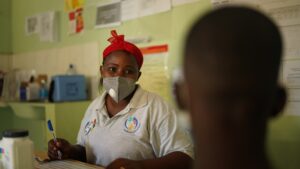m2m Supporting Internally Displaced Families in Mozambique
On World Humanitarian Day, which takes place on the 19th of August, mothers2mothers (m2m) is spotlighting our support for internally displaced families in Mozambique.
While the attacks earlier this year in Palma, Mozambique, may have made media headlines around the globe, sadly they are only the latest development in a growing humanitarian crisis. 62,000 people were forcibly displaced as a result of the March attack, adding to a total of around 700,000 people who had already been forced to leave their homes in Mozambique’s northern regions.
Internally Displaced Families in Mozambique
mothers2mothers, an African not-for-profit that employs women living with HIV as frontline health workers, has deployed a team of 50 frontline staff to the Cabo Delgado region in response, supported by the U.S. Centers for Disease Control and UNICEF. These “Mentor Mothers” are working in resettlement camps, door-to-door in local communities, and in health facilities to deliver health services and education to vulnerable women, children, and adolescents, with a particular focus on HIV prevention, care, and treatment. As m2m’s frontline workers are all women living with HIV who understand local challenges and speak local dialects, they are well-placed to meet the needs of the communities they serve.
 Ilda Kuleba, m2m’s Regional Director, who is based in Mozambique, explains:
Ilda Kuleba, m2m’s Regional Director, who is based in Mozambique, explains:
“The health system in Cabo Delgado was already buckling under the strain of decades of chronic under-investment and the COVID-19 crisis. The dramatic increase in internally displaced people could result in devastating health consequences, especially for vulnerable women, children, and adolescents.
“The HIV prevalence rate in Cabo Delgado among adults is already almost 20%, and we are seeing increases in HIV-positivity rates at the health facilities we work in as a direct result of the displacement crisis. HIV testing is a critical need, and those living with HIV need support to reliably access and stay on their life-saving treatment. This is particularly vital for pregnant women and new mothers, as if they are not on effective treatment, their children are at high risk of contracting HIV.
“We also urgently need to scale up efforts to find children living with HIV who may not yet have been identified as a result of the displacement crisis. Adolescents are another high-risk group – with support systems such as schools hard to access for displaced communities, accessing health care and negotiating safe sex can be near impossible.
“m2m has been operating in Mozambique since 2018, and our Mentor Mothers have already reached 3,989 clients in the region. We are able to serve local communities effectively because of our deep knowledge of Mozambique and our frontline team’s direct experience of living with HIV. But we need more international awareness of this growing health crisis and more support for our work.”






















